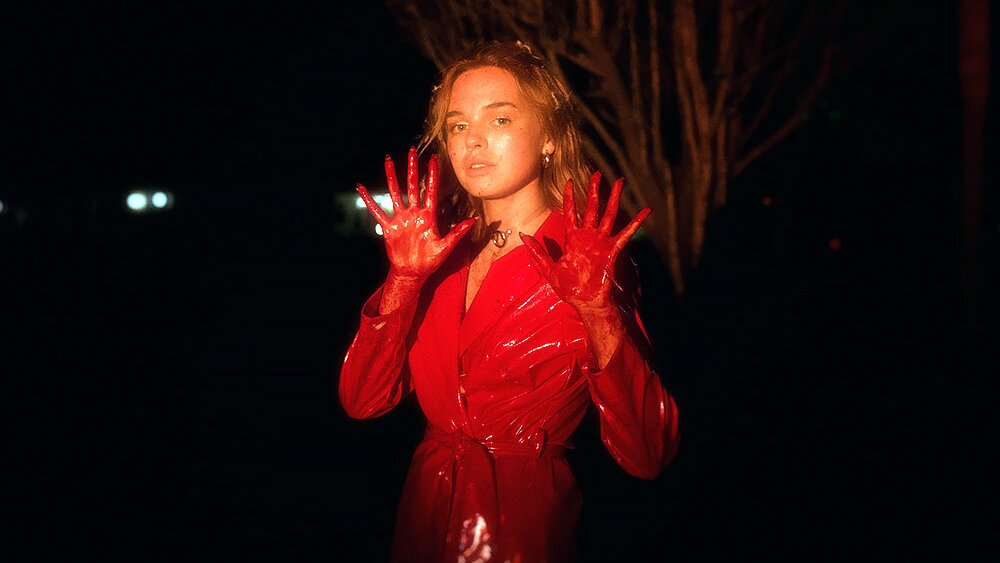Sam Levinson’s second feature, the difficult-to-say-five-times-fast Assassination Nation, is an exhilarating and uncompromising commentary on a generation that has become desensitized. Odessa Young, the film’s star, has said that it “deals with morality in such an unflinching way.” Unflinching it most certainly is.
The film begins with a montage of trigger-warnings and accompanying clips of the horrors to come, featuring the likes of: sexism, bullying, racism, the male gaze, murder, and toxic masculinity. It’s tongue-in-cheek but acts as a clever defence to anyone who may not get just how satirical it later attempts to be; this energetic introduction covers its own back. Set in the suburban town of Salem (a not-so-subtle call back to the witch hunts of the 1600’s), the film begins with the data hacking of Mayor Bartlett. His conservative anti-gay stance is called into question when photos of him in women’s underwear with male escorts are made available online. The hacker then targets the kind-natured school principal. When photos of his six-year old daughter in the bath are leaked, he is instantly branded a paedophile amongst his town and he’s not given a single moment to defend himself. After two authoritative examples, our trigger-happy hacker releases every text, email, photo, and piece of search history of half the town’s population in online files free to the public. What follows is a gruesome hunt for someone to blame. No matter how respectable one might appear, everyone has their secrets.

Of course, like with most things, fingers are immediately pointed at some of the most vulnerable. In this case – a group of young women. Levinson gives us a quartet of final girls who will no doubt become cult heroines in the years to come. Lily (Odessa Young), Bex (Hari Nef), Sarah (Suki Waterhouse), and Em (Abra) are the four horsemen of Salem’s apocalypse. When the local tech-nerd tells the town that the hackers IP address is coming from Lily’s house, the town shows no hesitation in donning their masks and hunting down the teens with pitchforks in tow.
The men whose darkest secrets got shared in the hack feel violated, and thus entitled to enact their revenge. What’s worse is that Lily herself was hacked – nude photos, videos, and texts with her married neighbour under the contact name ‘Daddy’ were made viewable to her parents and peers. The same men who once saw her as their student or friend now see her as an easy meal, feeling a sense of entitlement to her body. She shared it so now they deserve a taste for themselves.

One particularly memorable moment sees Lily walking down the street barefoot, in only a hoodie and pyjama shorts, after being kicked out by her mother. A man drives by and takes out his phone to video her. “Look everyone, it’s the slut of Salem!” She runs and he gets out of the car to pursue her between the white-picket fences of the picturesque American town. He takes out a pocket knife and she disappears around a corner. When he catches up to her he is brutally hit in the face with a shovel and knocked out. At my particular screening this was the first of many moments in which the audience erupted into applause. It was the first moment of real violence and it was immensely satisfying. A woman fighting back and a man getting his comeuppance, after the tense build-up of the first act, gave the audience a sigh of relief; maybe she’ll win.
These four young women are a man’s worst nightmare. Sexually liberated, progressively political, and confident – they question authority and bite back in debate. Even Lily’s father is visibly uncomfortable when she defends the principle and the photos of his daughter over dinner. The editing frames the experience of womanhood in 2018 with a visceral energy. There are scenes where the screen is cut up into thirds, following three of our protagonists as they manoeuvre through the same party in different ways. It forces you to pay attention to the little details of teen existence: the silence, the sighs, the moments of over-thinking and self-doubt. On top of the usual teen woes, in 2018 our kids are battling more foes, both online and offline, than ever before. Director Sam Levinson told Variety that the idea for the film came just days before his wife gave birth, and stemmed from a real anxiety about what kind of world he was bringing a child into.

There is a clear mob mentality afoot in the film’s final act, aggressive cries of “WE’RE GOOD PEOPLE!” through megaphones as the townsfolk drive through the night confronting one another. For these ‘good people’ of Salem, their young women are just sluts who had it coming. Assassination Nation holds up a mirror to everything we already do but shows us the violence it could lead to if we just keep being assholes to each other. Elena Lazic of Seventh Row said, “The film acknowledges the fact that the hatred and anger now at the forefront of American politics are logical consequences of attitudes that were already there.”
In today’s social climate, panic and outrage can spread online in just minutes. The loudest voice wins, and the rest of us are drowned out. Films like Assassination Nation remind us of the fact, and perhaps show us that there is a solution, don a red trench coat, grab your gal pals and fight back. Sometimes we just have to burn it all to the ground.




